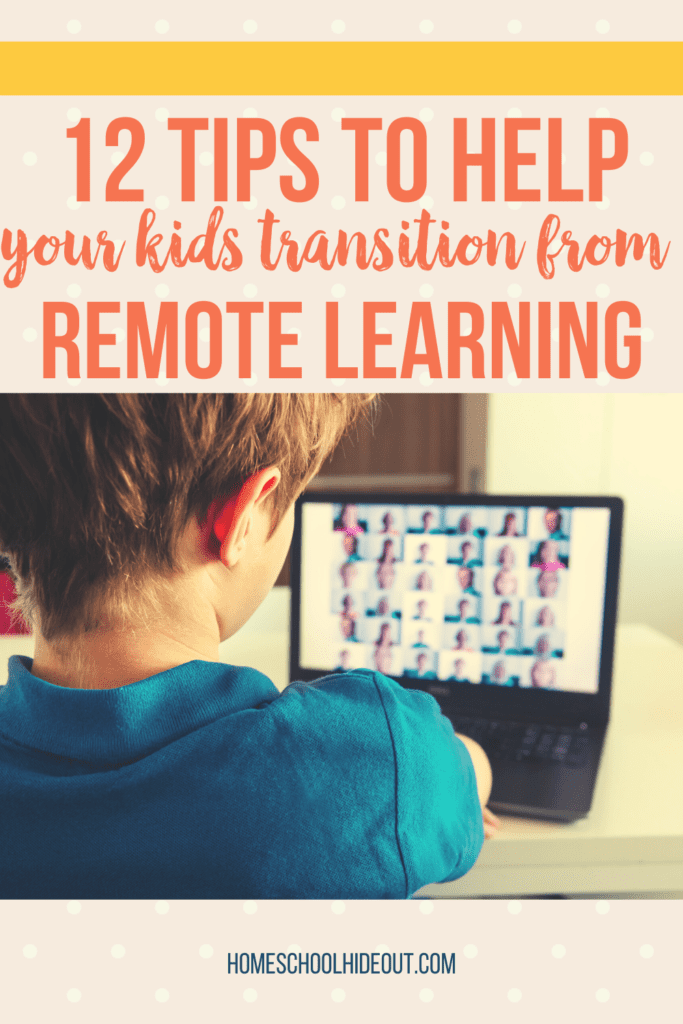Do you need help making the transition back from remote learning?
The pandemic has been hard on everyone across the globe, including kids. In the past year, most students had to transition to remote learning almost overnight. This not only impacted their academic performance but also affected their mental and emotional health. In fact, a survey showed that more than 25% of the students experienced a great deal of stress and problems because of the pandemic.
Despite parents, teachers, and students trying their best, learning over a computer screen is simply not as effective as in-person classes. Attending regular school gives students a structure, which is not possible to easily recreate at home. Moreover, remote learning has been particularly challenging for younger kids with a shorter attention span. Kids born or starting school during the pandemic may find it especially difficult to start in-person classes.

Fortunately, things are slowly but certainly returning to normal. Now that vaccines are being speedily administered and schools are reopening, it’s time to prepare your kids for back to school. Here are some useful tips to help your kids with the transition back from remote learning.
Create a Routine
During the initial days of the pandemic, most students made an effort to stay on top of remote learning. However, the pitfalls of online schools, such as no access to dependable internet and lack of in-person guidance, started taking a toll on students. And the result? Students started not logging in and skipping classes.
Whether your child has been snoozing through classes or spending too much time on their phones, it’s time to help them get back into the groove. Before in-person school starts, you should create a routine for your kids. Something as simple as waking up at a reasonable time, eating breakfast, and minimizing phone use during classes can prepare them for school.
Encourage Asking for Help
Starting a new school or a different grade is an anxiety-inducing experience. Even if your child is quite confident, their social skills may have taken a hit during the year-long break from school. That’s why you should encourage them to ask for help from teachers, and peers. Whether they are struggling to navigate their new school hallways or understanding assignments, they should not feel shy to seek help.
Ensure Necessary Precautions
While the pandemic is under control, it’s not yet over. Therefore, it’s reasonable to be concerned about your child’s safety as a parent. Rather than keeping your child home and missing even more school, you can rest assured that schools are following all the precautions to keep kids safe. To further alleviate your concerns, we suggest talking to the school administration to learn more about their safety measures.
Implement SEL Strategies
Social and emotional learning has a plethora of promising benefits for students. During the past year, students may have lost their ability to concentrate because of spending so much time in front of screens. Or they may find it difficult to interact and collaborate with other students on team projects.
With SEL resources, you can help your kids feel motivated and develop problem-solving skills. Moreover, SEL strategies have been shown to reduce behavioral problems and promote mental health. You can also ask the administration to introduce a Social Emotional Learning curriculum.
Start Small & Be Patient
In some ways, remote learning is a lot less demanding. Students don’t have to bother going to a different room for various classes, remembering to carry assignments, or making friends. But in a regular school, keeping up with all that and more can be overwhelming. It would be best to avoid putting any pressure on your child to figure everything out on their first day.
Look for Interactive Resources
You must remind yourself that you are not alone in this journey to introduce your kids to in-person learning. Many school administrations are finding creative ways to help students become familiar with regular school. Head over to the school website to find interactive videos, tutorials, and other resources that are designed to help students navigate a new school.
Sign Up for Orientation
If the school is planning an in-person orientation, there is no better opportunity to help your kids understand the school layout. This way they won’t feel lost on their first day of school.
Communicate with Other Parents
Whether your kids are starting a new school or you are struggling with certain school requirements, you should get in touch with the parents of your kids’ classmates. If you and other parents are comfortable with a meeting, you should plan a play-date. This will help your kids make friends before school starts and feel more at ease.
Explore Extracurricular Activities
Did your kids really get into baking during the pandemic? Or have they developed an interest in musical instruments? Rather than just focusing on academics, make sure your kids are also exploring their artistic and creative sides. Signing them up for extracurricular activities that they actually enjoy can help with the transition back to school.
Keep Up with School Emails
Usually, schools communicate important information via emails. Make sure you are regularly checking your inbox for any updates from teachers or school administration.
Be Involved
Your work doesn’t end once your kids are off to school. Transitioning back to school will take time. It’s best to stay involved in your child’s learning and development. Make sure you are regularly having a one-on-one with your kids to discover if they are struggling in any way. You should also make an effort to keep in touch with their teachers.
Seek Professional Guidance
It’s absolutely normal for students to initially feel nervous and out of their comfort zone. However, if your child is acting out or showing signs of severe anxiety, there is no harm in seeking guidance from a healthcare professional.
Final Words
After a long gap from in-person school, it’s easy to just focus on learning loss. But rather than just emphasizing academics, you also need to pay attention to your child’s mental health as well. Therefore, it’s imperative to give your child the space to grow mentally, socially, and emotionally.






